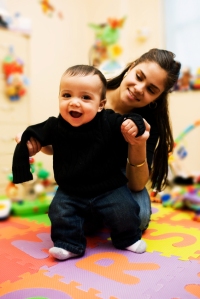 In 2002, the Office of Juvenile Justice and Delinquency Prevention in the U.S. Department of Justice estimated that there are 1,682,900 homeless and runaway youth under eighteen years of age in the United States. Of this number, anywhere from 6 to 22% are pregnant. This means that there could potentially be almost 400,000 homeless and pregnant young women in this country.
In 2002, the Office of Juvenile Justice and Delinquency Prevention in the U.S. Department of Justice estimated that there are 1,682,900 homeless and runaway youth under eighteen years of age in the United States. Of this number, anywhere from 6 to 22% are pregnant. This means that there could potentially be almost 400,000 homeless and pregnant young women in this country.
For pregnant and parenting youth who are currently homeless or lack adequate housing options, there are various programs through local governments and private organizations that can provide housing and other services. Incorporating these programs into advocacy efforts is a great way to help address homelessness among adolescent parents in the United States today.
Beyond providing shelter, housing programs provide the opportunity to offer many complementary resources and services for youth. Healthy Teen Network and Child Trends developed two resources on the core components of supportive housing?one resource defining and detailing what the core components include and a related report on findings from the field based on a national survey, phone interviews, and case studies. Articulating core components based on what we know ensures success among pregnant and parenting teens utilizing supportive housing services that embrace them and helps set a standard for the field. The identification of the core components provides guidance for supportive housing programs to meet the needs of pregnant and parenting teens by providing the supports and resources needed to help them succeed.?Two types of supportive housing for pregnant and parenting teens include:
Maternity Group Homes
The most widespread option for homeless young mothers or families is maternity group homes, also known as Second Chance Homes. Maternity group homes are adult-supervised, supporting group homes or apartment clusters for adolescent parents and their children who cannot live at home because of abuse, neglect, or other extenuating circumstances. These homes provide access to services such as child care, health care, transportation, counseling, education, job training, and employment assistance. Click here to find out if there is a maternity group home in your state, or call the National Runaway Switchboard at 1-800-RUNAWAY.
Transitional Housing
Many states have laws establishing transitional housing for adolescents. These transitional housing programs range from emergency short-term housing that includes shelter and at least one meal a day to more comprehensive programs that provide rental assistance, career training, and educational assessment and referrals to educational programs.
Other programs that support pregnant and parenting teens secure adequate housing include:
Temporary Assistance for Needy Families
Under the federal Temporary Assistance for Needy Families (TANF) program, in order to qualify for welfare assistance, young parents usually must be living with a parent or guardian. However, for young parents who have applied for TANF aid who have no parents, legal guardian, or other appropriate adult relative that allow the young parents to live with them, or in a case where a state agency has determined that it is not in the youth?s best interest to live with his or her parent or legal guardian, the state must provide or assist the child in locating a Second Chance Home, maternity home, or other appropriate adult-supervised living arrangement.
Extended Support for Foster Youth
Federal and state laws also provide assistance with housing and other necessities to young people who have ?aged out? of foster care, i.e., people who have reached the age of majority in their state, which is usually 18 years old.
Young parents who are homeless or whose family home is no longer a safe or healthy option may also be involved with child protective services. For more information on advocating for these youth, see this fact sheet from Healthy Teen Network and the American Bar Association Center on Children and the Law, Advocacy for Pregnant and Parenting Teens in Foster Care.
Remember, most homeless pregnant and parenting teens are scared and just need someone to listen and advocate for their well-being. Being aware of the federal, state, and private programs put in place can largely help these teens and their children.
What are your success stories working with homeless pregnant or parenting teens?
Like this:
Loading...
Source: http://healthyteennetworkblog.org/2013/03/20/helping-pregnant-and-parenting-teens-find-housing/
Brothers Grimm Tate Stevens Miss Universe 2012 x factor x factor john kerry eastbay
No comments:
Post a Comment
Note: Only a member of this blog may post a comment.